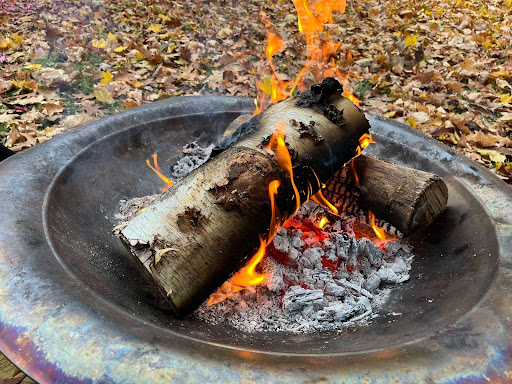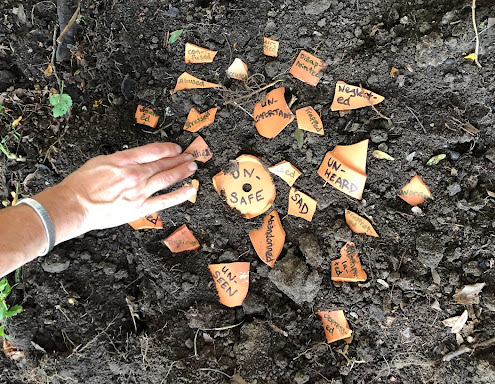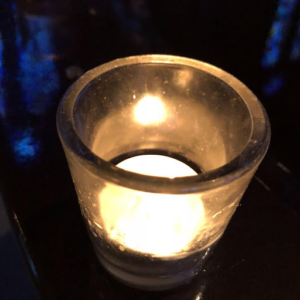Widening the Circle of Grief: An Exploration of Personal & Collective Grief
by Julie Swanson
Acknowledgement
This blog post was inspired and influenced by Francis Weller’s book, The Wild Edge of Sorrow. I have tried to give credit to phrases and sentences but in truth Francis’ words are woven with my own. Also, special thanks to Endings Matter partner, Stephanie Steigerwaldt, for editing this piece and contributing personal photos.
We hope you will join us for CORE Circle on Friday, December 17, 2021 from 10-11:30am to explore the questions raised here and more. Join via Zoom using the following link: https://tinyurl.com/5n87um29. Contact Julie Andersen if you have access needs.
I have been noticing grief. I have come to realize there is grief I see and know the name of… and then there is so much more. There are many “ways and styles” of grief that were unknown to me. There are layers upon layers of grief.
At first I found myself saying “I was not taught about grief” and then I realized that, even though I didn’t take a class, I had learned about grief from family, peers, and the broader American culture in the following ways:
Avoid grief
Grief is sad, hard, heavy. Grief doesn’t feel good. You should avoid things that don’t make you feel good. Avoid grief.
Get over grief as quickly as you can
It is unhealthy to grieve for “too long”. It is OK to grieve at a funeral, but when I was still grieving my friend Kendra’s death three years later, I felt the need to apologize. “I’m so sorry… it’s been three years..” Funerals are a couple of hours, corporate bereavement time gives a few days (if you are lucky). Grief is something you should “get over”. Quickly.
Apologize for your grief
Even at funerals, people commonly apologize when tears show up. I learned to feel badly about crying in front of other people. Crying makes people uncomfortable. I am responsible for other people’s comfort. Apologize when your grief makes others uncomfortable.
Now, after taking a courses through UW-Madison’s Continuing Studies on how to provide grief support and training as an end-of-life doula I am learning into a different relationship with grief which is more respectful and compassionate. I am learning that:
Grief doesn’t “happen” to you
Working with grief is not passive, it is an active, ongoing practice of “deepening, attending and listening”.
Grief is something to tend…
like a fire or a garden, and from which to learn. And, we must be able to name grief in order to tend to it.
The weight of untended grief accumulates
And eventually comes out in unfortunate ways that can further hurt ourselves or others.
You don’t “get over” grief
Grief is not an illness to be cured nor a brokenness to be fixed, but we can learn to heal.
Grief needs to be witnessed
As Francis Weller explains: “Grief has always been communal. Grief is an intensely interior process that can only be navigated in the presence of community.”
In the book The Wild Edge of Sorrow, Francis Weller invites us into an “apprenticeship with sorrow”… a prolonged period of learning that offers us the chance to grow our capacity to stay present with grief. Through meaningful rituals, community, silence, solitude and effective practices we are offered the opportunity to learn a “more skillful pattern of relating to grief”.
How might we learn into a deeper relationship with grief?
“What if grief is not something to endure or get over but a relationship that will reshape us in some fundamental way? What if we must learn the art and craft of grief in order to discover the profound ways it ripens and deepens us?” (Francis Weller)
What if we started our apprenticeship in a community of Circle Practice?
Let’s learn and explore together. Please join us for CORE Circle on Friday, December 17, 2021 from 10-11:30am. Join via Zoom using the following link: https://tinyurl.com/5n87um29. Contact Julie Andersen if you have access needs.
Resources
The Wild Edge of Sorrow by Francis Weller
Coming Back to Life by Joanna Macy and Molly Brown
Finding Refuge: Heartwork for Healing Collective Grief by Michelle Cassandra Johnson
Grief Support Specialist Training with UW-Madison Continuing Studies
Going with Grace, End-of-Life Doula Training with Alua Arthur






